November 20 is World Children's Day - a day marking the Declaration of the Rights of the Child by the UN General Assembly in 1959. This day is celebrated to raise awareness about children's rights and welfare. At HundrED, we work with the ultimate goal of supporting every child to flourish in their lives, no matter what happens. This goal, towards which we aim together with hundreds of education innovators, partners and community members, cannot be achieved without including children and youth in the conversation.
Article 12 of the Declaration of the Rights of the Child says that every child has the right to express their views, feelings and wishes in all matters affecting them, and to have their views considered and taken seriously. This principle recognises children and young people as actors in their own lives and applies at all times throughout a child’s life.
Every child has the right to express their views, feelings and wishes in all matters affecting them, and to have their views considered and taken seriously. - Declaration of the Rights of the Child, Article 12
Quite often, children and youth are left out of the decision making processes that merely affect them - and many express frustration with this matter. As adults working with children and youth, we need to become their allies - recognising their views, their needs and realities in dialogue with them. Acknowledging that it is not only the future which belongs to them: it is the present - and they deserve to be listened to every day of the year.
We asked HundrED's Youth Ambassadors what they would like education policy makers to know about their needs. Six main themes stood out:
1. Trust children and youth:
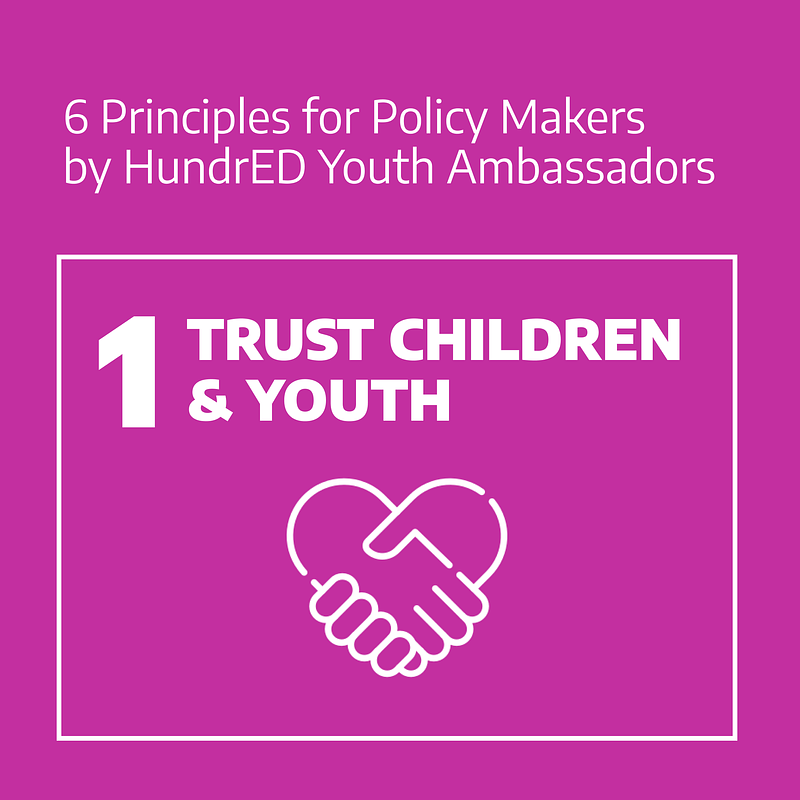
"Education policy makers need to understand that children are capable of independent thought, exploration and maturity. Keeping that in mind, policy-makers must frame coursework that will truly allow us to grow and not limit us to memorizing facts." (Samara Bhagat, India)
"Treat youth like they are worth something: recognize their mistakes, but their good sides alike to fully adapt themselves. Don’t let yourself be convinced that youth are troublesome, because this gives a message to the youth that they are untrustable, and it agitates them even more. Policy-makers should place more trust in the youth." (Yılmaz, Türkiye)
2. Include youth in decision making
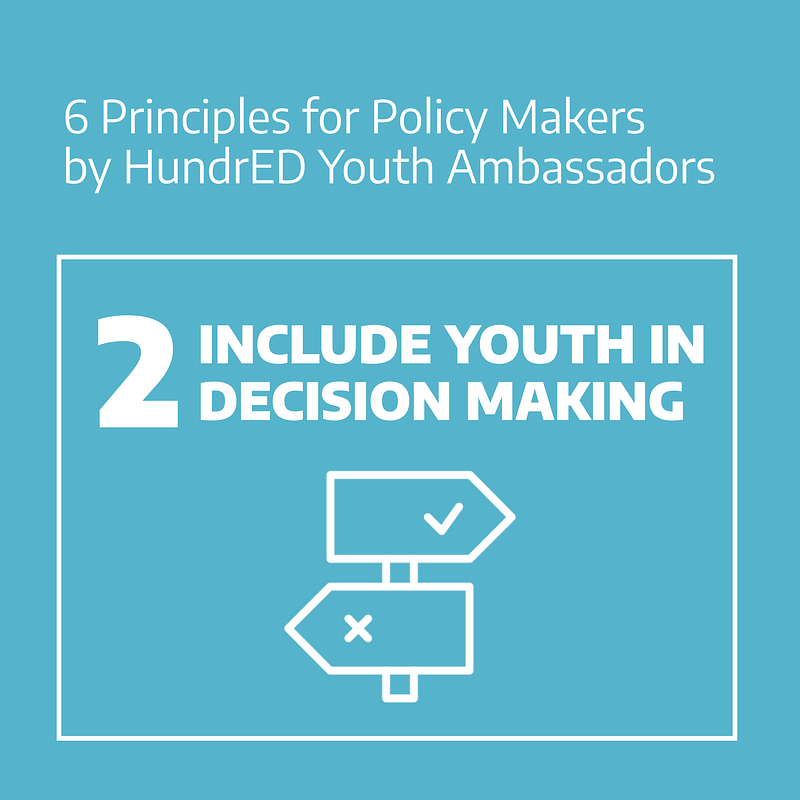
"I believe that education policy makers should make a team of youth leaders from different schools of a city, and take suggestions from them about the syllabus, moreover they should consult with university teachers and ensure that the syllabus is holistic and also modern." (Aryan, India)
"Decision-makers need to reach out to us! They need to ask us what we need to thrive." (Isabella, USA)
"If you want to make a perfect pizza box, then you need a pizza to test it out. If you want to make a policy that matches children’s and youth’s needs, then you need to involve children and youth people to participate in that policy-making process." (Muhammad, Indonesia)
3. Prioritise compassion and empathy:
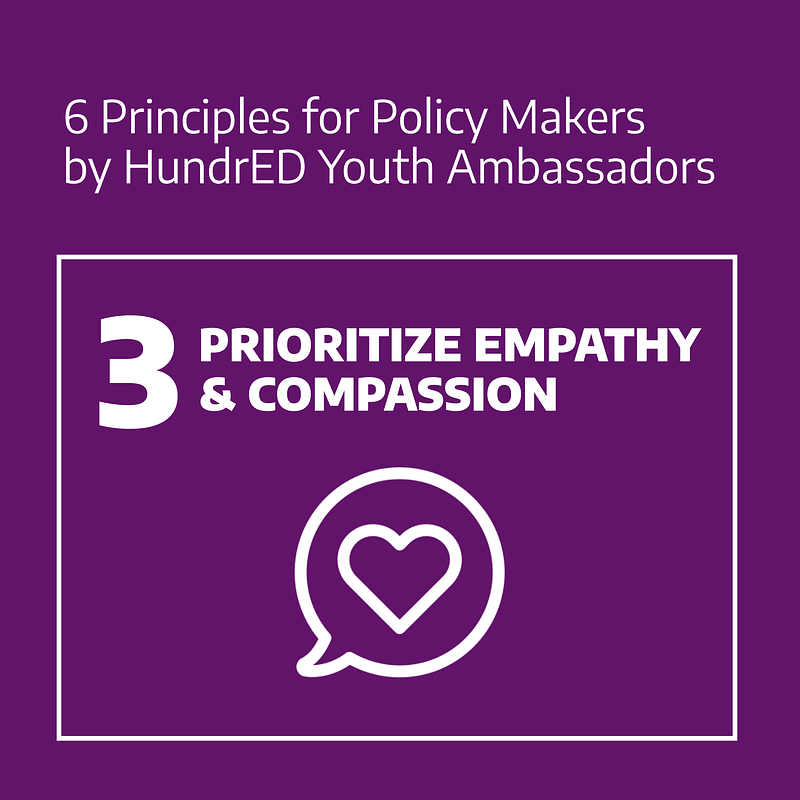
"The children and the youth of today need compassion along with knowledge. The students of today have been through a lot. From missing out on their precious childhood years locked in the pandemic to witnessing proxy wars, earthquakes and destruction. It is not easy for them either. The interpersonal relationships they witness are also broken, impacting their overall wellbeing. These facts just reiterate the need to treat the young generation as humans first, learners later." (Sharanya, India)
"Don’t add more pressure! Pressuring does not lead to acquiring new knowledge, but to fear of failing." (Freddie, Germany)
4. We learn in different ways and have different passions
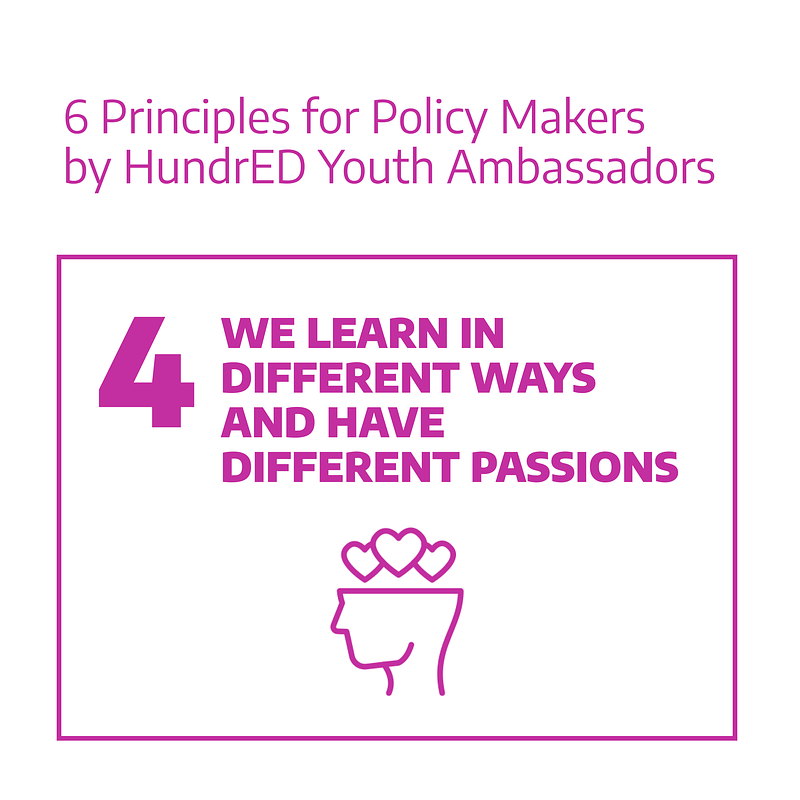
"Education policy should focus on supporting passionate teachers, reducing class sizes, providing social-emotional learning, and offering personalized learning plans tailored to students' diverse learning styles, strengths and backgrounds. The goal should be to nurture students' natural curiosity in a safe environment where they can explore passions and reach their full potential." (Carlos, Peru)
"Make learning an all-round experience: inclusive and accommodative for each and every type of student and learner, including the special needs and disabilities. Learners should be given an opportunity to learn things theoretically, practically and also acquire skills that will form a foundation not only in their careers but also in their own personal day to day lives such as leadership, decision making, critical thinking and creativity and social skills." (Michelle, Kenya)
"Every child is unique, and their learning needs and paces vary. Policies should support personalized and differentiated learning approaches to cater to individual strengths and challenges." (Gabriela, Colombia)
"Offer education in students’ mother tongues. So many students struggle with learning the language of the majority in order to learn or go to school. Yes, even for those fundamental rights. Minorities also have the right to learn and go to school. You cannot force anyone to learn any language. Regardless of their nationality, they have the right to receive education in their own language. Every culture is a color in my view, and we should preserve that. Education is a must for every child. It will cause bigger problems and inequalities if education policy makers ignore this need." (Mahmut, Türkiye)
5. Emphasise holistic learning - while adding some fun to it
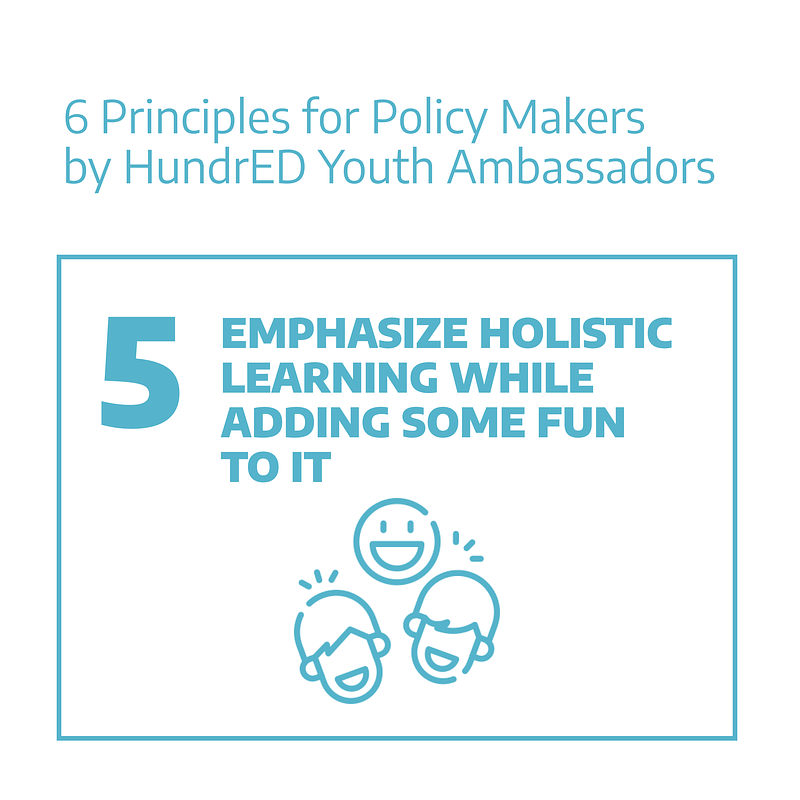
"I think the world has placed such a heavy emphasis on excellence, performance and achievements that it has overlooked that learning should be fun and it should push you to discover what you truly love and what to do in the future." (Emily, Portugal)
"School can be a devastating experience or also the best time of your life, so make sure teenagers are enjoying what they are learning. How can we offer that? By implementing creative activities for children to identify what they want to learn more of, by exploring and practicing. That can lead us to a healthy school community, where everyone enjoys what they are learning." (Anna, Venezuela)
"Education policy makers should know that children and the youth need life skills such as managing finance, digital literacy, stress management, time management, etc." (Saanjh, Netherlands)
"Make sure children have enough time to focus on extracurriculars (in school and outside) and give the creative minds of individuals a stir, so that they can think beyond what’s in front of them and have fun doing what they love. In this way children are more likely to find a passion and possibly create change and enhance the community." (Nabiha, Bangladesh)
"Prioritize the provision of adequate resources such as qualified teachers, modern infrastructure, and updated curriculum materials. Additionally, they should emphasize the importance of holistic development by incorporating extracurricular activities and mental health support into educational frameworks." (Chalita, Ethiopia)
6. Address global issues while giving us hope
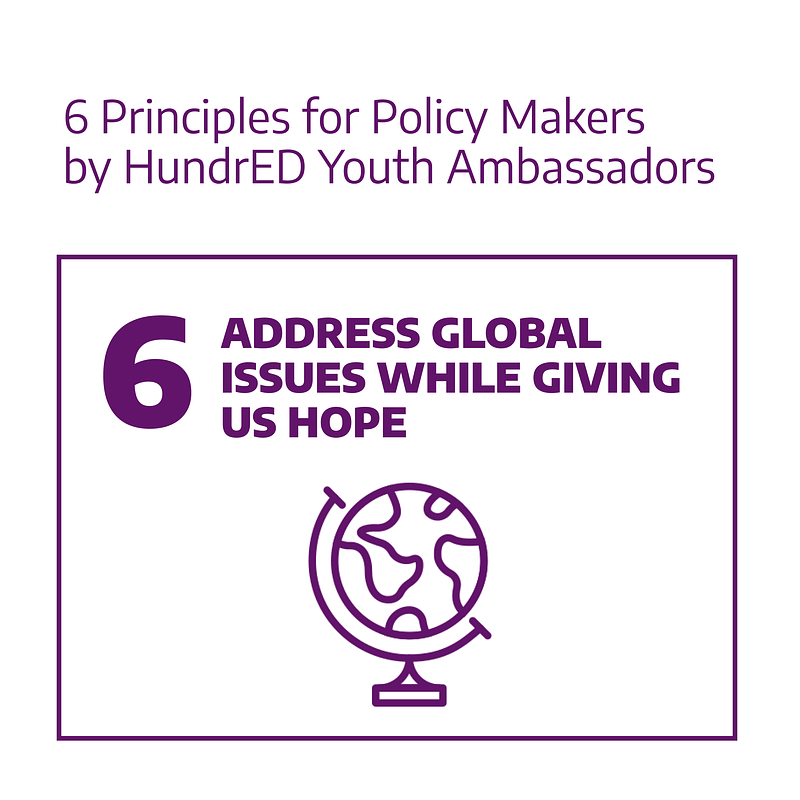
"We need to understand the need for justice. Our education systems have long depreciated any chance at equity or equality education. Now the only choice we have is justice; to right the wrongs that we've already been dealt and move from there." (Nisha, USA)
"Give us HOPE! Give us positive climate action updates instead of climate news that are always negative!" (Rhiannon, Canada)
"Real life matters. Don’t be afraid to talk about taboo topics." (Sara, Poland)
"I think financial literacy is something which always gets a blind eye from everyone around the world. In India finances are treated as something which only bankers or the top 1% need to know about, but in reality it is equally important for everyone to know how to handle their finances. This is something that should be taught at a high school level."(Kabir, India)
"The Youth community should be exposed to education related to current world problems and topics because that is what they truly need to know. Outdated systems from centuries ago are no longer an option, meaning educators really have to focus on consecutively revising what really defines education." (Kirsten, Switzerland)
The Youth Ambassador Programme aims to put young people’s voices at the forefront of change-making. Learn more about our Youth Ambassadors.
